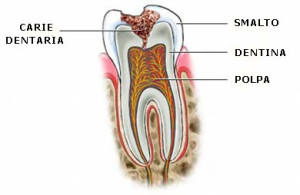Hypersensitivity of the teeth is the condition for which an annoying pain in the teeth is felt when they come into contact with cold or hot or particularly sugary foods. Not only that, the discomfort can also be felt in situations other than chewing, i.e. during the cleaning of the teeth or even during the phases of breathing.
The causes of hypersensitivity of the teeth
The sensitivity of the teeth increases proportionally with increasing exposure of the dentin. Dentin is the part of the tooth that is interposed between the enamel, which represents the most superficial part, and the pulp of the tooth area where the nerve endings and blood vessels that supply the tooth are located.
When the enamel thins, the thermal and mechanical stimuli more easily reach the deepest part of the tooth, causing the unpleasant sensation of discomfort and pain.
To cause hypersensitivity of the teeth is therefore a progressive erosion of the enamel whose causes are attributable to:
- Poor or incorrect oral hygiene;
- Increased acid pH in the mouth due to the consumption of too acidic foods;
- Bruxism;
- Use of too aggressive products (abrasive toothpastes, whitening products …);
- Presence of dental caries;
- Periodontitis or other acute oral infections
- Dental trauma with microfractures.
A diagnosis of hypersensitivity of the teeth will therefore be mainly linked to three factors:
-
 Erosion of the enamel due to acidic substances: in this group we can include both factors related to poor nutrition, which prefers acidic foods (citrus fruits, carbonated drinks …), and related factors poor oral hygiene. The increase of bacteria in the oral cavity favors the onset of plaque and tartar, the prolonged accumulation over time corrodes the dental enamel causing caries and infection. If dental hypersensitivity is due to one of these causes, it will be sufficient to balance your diet and take better care of your dental hygiene, perhaps even planning deep cleaning sessions. By rebalancing the pH of the oral cavity and keeping the mouth clean, hypersensitivity can be drastically reduced.
Erosion of the enamel due to acidic substances: in this group we can include both factors related to poor nutrition, which prefers acidic foods (citrus fruits, carbonated drinks …), and related factors poor oral hygiene. The increase of bacteria in the oral cavity favors the onset of plaque and tartar, the prolonged accumulation over time corrodes the dental enamel causing caries and infection. If dental hypersensitivity is due to one of these causes, it will be sufficient to balance your diet and take better care of your dental hygiene, perhaps even planning deep cleaning sessions. By rebalancing the pH of the oral cavity and keeping the mouth clean, hypersensitivity can be drastically reduced. - Enamel erosion by mechanical stimuli: in this case we can instead include all the conditions for which the enamel abrasion occurs due to mechanical stress. A case may be that of bruxism, the involuntary grinding of the teeth causes a gradual consumption of the enamel and therefore an increase in hypersensitivity. To overcome this problem, the use of invisible bites is sufficient. Another cause could be too vigorous brushing during oral hygiene, in this case it would be useful to have a brush with soft bristles and a not too aggressive toothpaste to avoid further abrasions of the tooth surface.
- Ongoing pathologies: in the latter group we can instead count as a cause of the hypersensitivity of the teeth pathologies affecting the gums (gingivitis, periodontitis), whose inflammation exposes the tooth more to thermal or mechanical stimuli and caries which, if neglected, involves the gradual erosion of the tooth. Specific dental treatments designed to treat this type of pathology will also reduce dental hypersensitivity over a short period of time.
Hypersensitivity of teeth in pregnancy
Hormonal changes during the pregnancy period can affect the pH of the oral cavity and in particular the alteration of saliva. A more acidic pH can lead not only to an increase in the hypersensitivity of the teeth, but also to a greater predisposition to contract caries or gingivitis.
















